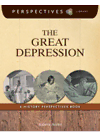
The Great Depression. A History Perspectives Book PDF
Preview The Great Depression. A History Perspectives Book
Page intentionally blank The GreaT Depression A H I S T O R Y P E R S P E C T I V E S B O O K Roberta Baxter Published in the United States of America by Cherry Lake Publishing Ann Arbor, Michigan www.cherrylakepublishing.com Consultants: Douglas A. Irwin, Professor, Economics Department, Dartmouth College; Marla Conn, ReadAbility, Inc. Editorial direction: Red Line Editorial Book design: Sleeping Bear Press Photo Credits: Dorothea Lange/Library of Congress, cover, 1, 30; Harris & Ewing Collection/Library of Congress, 4, 9, 13; Bettmann/Corbis, 6, 25; Farm Security Administration/Library of Congress, 10; Russell Lee/Library of Congress, 14; Albert M. Bender/Library of Congress, 16; J.A. Mitchell/Corbis, 19; Ernest Lindsay/Corbis, 21; National Photo Company Collection/Library of Congress, 22; Marion Post Wolcott/ Library of Congress, 28 Copyright ©2015 by Cherry Lake Publishing All rights reserved. No part of this book may be reproduced or utilized in any form or by any means without written permission from the publisher. Library of Congress Cataloging-in-Publication Data Baxter, Roberta, 1952- The Great Depression / Roberta Baxter. pages cm. -- (Perspectives library) Includes bibliographical references and index. ISBN 978-1-63137-618-4 (hardcover) -- ISBN 978-1-63137-663-4 (pbk.) -- ISBN 978-1-63137-708-2 (pdf ebook) -- ISBN 978-1-63137-753-2 (hosted ebook) 1. United States--History--1933-1945--Juvenile literature. 2. United States--History-- 1919-1933--Juvenile literature. 3. Depressions--1929--United States--Juvenile literature. I. Title. E806.B37 2014 973.917--dc23 2014004767 Cherry Lake Publishing would like to acknowledge the work of The Partnership for 21st Century Skills. Please visit www.p21.org for more information. Printed in the United States of America Corporate Graphics Inc. July 2014 Table of Contents In this book, you will read about three people living through the Great Depression. The hard economic times that hit the United States in the 1930s brought struggles to many. As you’ll see, the same event can look different depending on one’s point of view. Chapter 1 4 ................................................... Arthur Maxwell: Government Worker Chapter 2 14 ................................................. Tom Mallory: Civilian Conservation Corps Chapter 3 22 ................................................. Clara Jennings: 12-year-old Girl Look, Look Again 30 ........................................ Glossary 31 .................................................... Learn More 31 ................................................. Index 32 ........................................................... About the Author 32 .................................... 1 Arthur Maxwell Government Worker I work at the Department of Commerce for the United States. I am a junior economist, so I collect and analyze the numbers of employed people, salary amounts, types of jobs, and other information. Other government officials can then see the state of the economy. When I started my job in July 1929, it seemed that the economy was soaring. People had 4 good jobs, the stock market was booming, and prices of goods were reasonable. The farmers, Second Source especially those out West, faced Find another source on the problems with low prices for beginning of the Great their crops. But I believed that Depression. Compare it with would soon level out and the the information in this chapter. farmers would be in better shape like the rest of the country. The events of October to November 1929 startled everyone. The value of company stocks listed on the stock market went way down. People started selling their stocks to get what value was left. Some stocks became worthless. The people who owned those stocks lost all the money they had invested. The newspapers estimated that by the end of 1929, several billion dollars had been lost. Mostly banks or wealthy people, like business owners, owned stocks. Many stocks dropped 5 Crowds gathered in shock outside the New York Stock Exchange during the 1929 crash. incredible amounts in value. For example, General Electric Company stock was worth $73 per share in September 1929 and in September 1932 it was worth less than $16 per share. Other stocks dropped in value more than that. Banks also lost money that they had invested in stocks. This forced the banks to stop loaning money. People were not 6 spending either. They were worried about losing their jobs. I was sure President Hoover would have an idea of how to get out of the economic mess that became the Great Depression. President Hoover’s staff held meetings to discuss what the federal government should do The Stock Market Crash People invest their money by buying shares of companies. These shares are called stock. When investors hear that the value of a stock is going down, they sell stock before the price goes lower. Many sales make the stock value go down. More people sell and the cycle repeats. If too many people sell, it causes a crash. When the stock market crashed in 1929, thousands of stocks became worthless. People lost millions of dollars that they had invested. 7 about the economy. I wasn’t at the meetings, but they asked for my employment and salary data. President Hoover believed that people had spent too much on stocks and that the economy would even out. He said that Americans had always stood on their own two feet and they should continue to do so. He argued that government should stay out of business because government was too inefficient and would slow business down. I agreed with the president that the country would come out of the stock market crash with stronger growth. But I was wrong. The economy got worse, more people were out of work, and the banks were failing. Newspapers blasted President Hoover and his policies. They wanted him to pay unemployed people and spend money that our government did not have. Like the president, I didn’t believe the government should run up a huge debt. We had to keep the government out of 8
